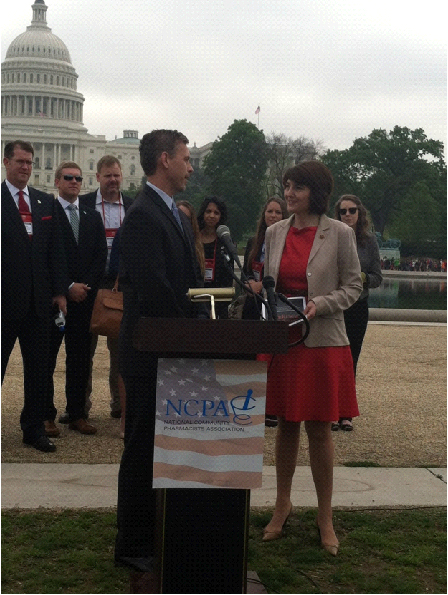Community pharmacists’ prescription for Congress: A dose of common sense
Should a Medicare senior’s “preferred” pharmacy be nine hours away by plane? Should a community pharmacy be reimbursed $300 below its cost of acquiring and dispensing a lifesaving drug? Should patients endure long trips for basic health services that a local community pharmacist is qualified to provide?
Of course not.
These issues brought more than 300 independent community pharmacists to Washington May 7-8 for hundreds of meetings with their Members of Congress to urge common-sense solutions.
Independent community pharmacists provide expert medication counseling and other essential health care services to patients. In thousands of underserved rural and inner-city communities across the country, these small business health care providers are a particularly vital health resource.
To support their ability to continue caring for patients, independent community pharmacists urge Members of Congress and other federal health officials to support three important policies.
First, enhance pharmacy choice and competition for seniors in the Medicare Part D prescription drug benefit. Any willing pharmacy that can accept a drug plan’s reimbursement and other contract terms should be allowed to offer seniors “preferred” co-pays. The Ensuring Seniors Access to Local Pharmacies Act (H.R. 4577) introduced by U.S. Reps. Morgan Griffith (R-Va.) and Peter Welch (D-Vt.) would allow “any willing pharmacy” located in a medically underserved area to participate in all Medicare Part D drug plan networks, including the plan’s discounted or “preferred” network.

CEO Doug Hoey speaks with U.S. Rep. Cathy McMorris Rodgers (R-Wash.) at a Capitol Hill rally May 8.
Right now drug plan middlemen known as pharmacy benefit managers (PBMs) arbitrarily decide which pharmacies are “preferred.” Often, the nation’s 23,000 independent community pharmacies are never extended this opportunity and are turned down or ignored when they offer to accept the reimbursement and other conditions required for “preferred” status.
The result is seniors in rural communities face either higher co-pays or trips of 20+ miles to a “preferred” pharmacy – likely passing many excluded independent pharmacies along the way. In Florence, Ore. (population: 8,466), Medicare beneficiaries live within one mile of five different pharmacies, on average, but must travel more than 40 miles to reach a “preferred” pharmacy in either the Humana Enhanced or Humana Preferred Rx drug plan. In the Northern Marianas Islands, the closest “preferred” pharmacy for some beneficiaries is nine hours away by plane in Hawaii! Believe it or not, at least one patient was denied her request to patronize the only pharmacy in the Islands!
Second, Congress and federal health officials should ensure basic standards to how community pharmacies are reimbursed by PBMs for generic prescription drugs, particularly those experiencing huge price increases. About 80 percent of drugs dispensed are generics, which pharmacists promote to help save beneficiaries and Medicare money. But the reimbursement system for these medications is a mystery and raises questions as to whether Medicare is overpaying PBMs.
Moreover, the cost of scores of generics is skyrocketing 1,000% or more virtually overnight, but the PBMs may wait months before updating reimbursement. That leaves community pharmacies with unsustainable losses, such as $300 on just one prescription. At the same time, nothing prevents PBMs from underpaying pharmacies and billing Medicare at a much higher rate – a practice examined in a recent Fortune article entitled “Painful Prescription.” Bipartisan legislation (H.R. 4437) was introduced recently by Reps. Doug Collins (R-Ga.) and Dave Loebsack (D-Iowa) to address this and deserves support.
Third, community pharmacies can help alleviate a shortage of primary care providers that is expected to grow more severe in coming years, particularly with more patients obtaining insurance coverage. Pharmacists are highly trained and qualified to provide basic health services, in coordination with patient’s primary care physician. Common examples include health and wellness screenings, chronic disease management, immunizations and medication management.
Pharmacists should be recognized as providers and reimbursed reasonably for such care. California recently enacted such a law and at the federal level H.R. 4190 was introduced by Reps. Brett Guthrie (R-Ky.), G.K. Butterfield (D-N.C.) and Todd Young (R-Ind.) to target medically underserved communities. In approximately 1,800 rural towns, independent community pharmacies are the sole pharmacy providers.
In these and other areas, independent community pharmacists are prepared to work constructively with Congress and other policymakers to promote better health outcomes and lower costs such as through proper medication utilization.
To learn more and take action, go to NCPA-ActionCenter.com.
The views expressed here are the author's, and do not necessarily reflect the opinions of DSN.

